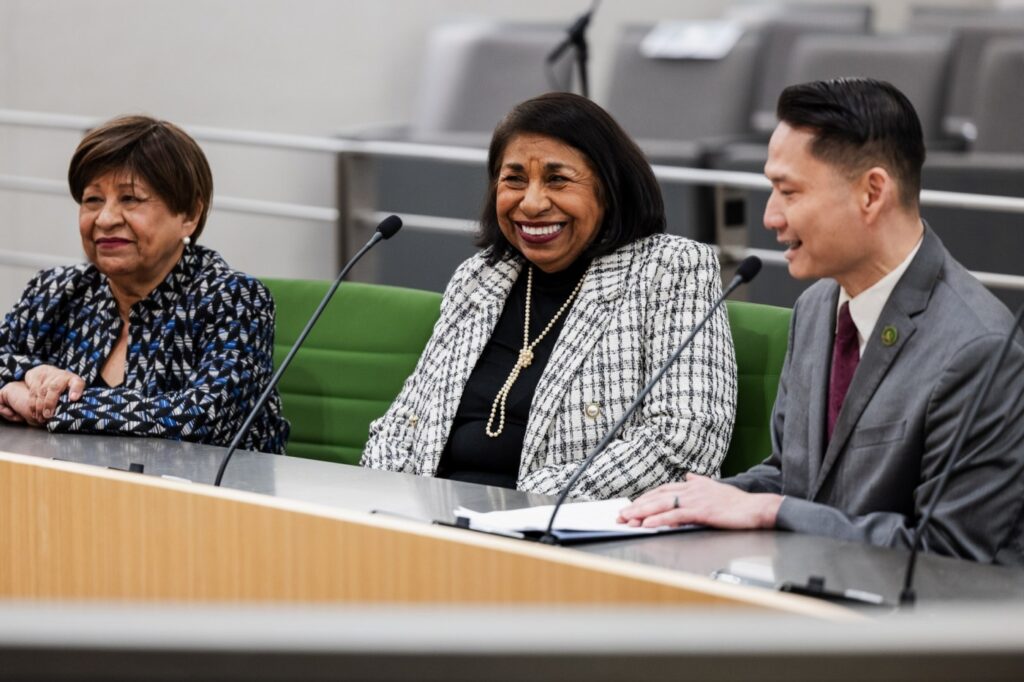
Sandra Mendez Duran was studying at UC Riverside when she noticed two names in a book: Gonzalo and Felicitas Mendez.
Duran was familiar with the names — they were her parents’ — but not the story that went along with them, the story of a young couple who fought back when they were told their children weren’t allowed to attend a “White” school, a couple who without many resources won their case, leading to the desegregation of California’s schools.
She called her mother and asked, “Could this be us?”
Felicitas Mendez’s response was incredulous. “It’s in a book?”
Duran told that story while advocating in Sacramento on Wednesday, March 20, for legislation that would incorporate the Mendez v. Westminster case into history and social science curriculum standards for California’s public schools.
Related: Legislators want Mendez desegregation case taught in California schools
After their children were denied admittance into the Seventeenth Street School in Westminster, the Mendez parents, along with four other families, filed a class-action lawsuit against four Orange County school districts in 1945. The families were successful, and the decision led to the repeal of segregation laws in California in 1947.
The federal case is considered to have set the stage for the landmark U.S. Supreme Court Brown v. Board of Education case seven years later that said segregation in public schools is unconstitutional.
Sylvia Mendez, now 87 years old, says she still remembers that day when she tried to go to school, alongside her brothers and cousins. Her cousins had lighter skin and hair and were told they could pass as Belgian and be admitted into Seventeenth Street School, she said, but the Mendez kids were turned away.
“I’m sorry, Mr. Mendez, but we’re not allowing Latinos in the school,” the principal told her father when he inquired why his children were barred from the school.
The school board didn’t help — certain cities in Orange County have segregated Latino students from their schools, she said her father was told. So her mother proffered up the plan: They would get a lawyer and fight those policies.
And that’s how it all started.
“I want all the students in this wonderful country of ours to know that it is possible for all of them to have that same equal education at this time, and I want them to know how it all happened, how Mendez v. Westminster was started,” said Mendez.
“California was the first state to be integrated; how could it not be in our history books?” said Mendez.
It’s important for children to learn the story of Mendez v. Westminster, Duran said, because “it’s not just a Latino story.” People of various ethnicities and faiths played a part in making the case successful, and it’s a story about powerful women, from her aunt who raised the alarm when the school turned her brother’s kids away to her mother who ran the farm while her husband was in a courtroom all day to the sisters who continue to advocate for education.
The bill from Assemblymember Tri Ta, R-Westminster, and Sen. Tom Umberg, D-Santa Ana, was before the Assembly Committee on Education on Wednesday. Ta, the former mayor of Westminster where a park honors the Mendez family, says he’s “passionate” about the bill.
“We want to make sure we continue to advocate for our bill, we continue to advocate for the issue until the bill gets passed,” he said.
The bill is supported by the California Charter School Association, Westminster School District, the cities of Fountain Valley and Westminster and the Orange County Hispanic Chamber of Commerce, to name a few.
Despite the win, the case was difficult for the Mendez family, the sisters said. It took a mental and physical toll on her parents, they said, who had to rally their Latino community for support.
“People were afraid. People said, ‘Don’t bring trouble, don’t bring attention to us,’” Duran, 73, said her mother relayed.
“It took everything they had, including all their finances, everything they had to fight this case,” said Duran. “When they won, they moved back to Santa Ana and life just went on, and life was difficult, and they worked hard. But they never talked about it because they did not realize the impact this case had.”
Related Articles
California’s state Senate is set to hit gender milestone
Sacramento Snapshot: Mandatory reporting in domestic violence cases can affect children, bill’s author argues
Sacramento Snapshot: Legislators unveil plan to tackle fentanyl and retail theft. Here’s what it includes
State lawmakers aim to short-circuit income-based utility bill plan
Sacramento Snapshot: What bills are OC legislators pushing this year?
Educating Californians on the landmark case is a labor of love for Mendez, who travels around the country to teach students how her parents fought for everyone to have equal access to education. And it’s the culmination of a promise she made to her mother nearly 30 years ago before her death.
Felicitas Mendez no longer wanted to keep to herself the details of how California became the first state to desegregate its schools.
“Sylvia, nadie sabe esto, nobody knows about what we did. Somebody has to go out there and start talking about this, it’s so important,” Mendez recalled her mother saying.
So for the past 25-plus years, Mendez has been traveling the U.S. teaching about the case. And now, it’s one step closer to being taught in California’s schools.
After the sisters concluded their testimony Wednesday, several members of the Education Committee asked to be added to the bill as co-authors. It then passed unanimously out of the committee.
